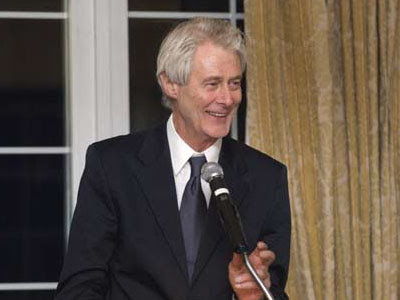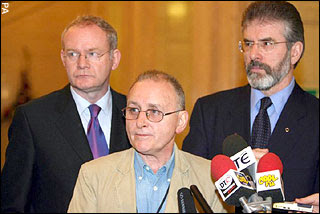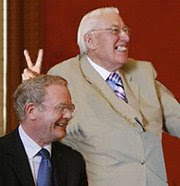
Padraig O'Malley's profile, taken from the Eire Society of Boston's 2008 Gold Medal Awards:
Padraig O'Malley was born in Dublin Ireland in 1942. He was educated at University College, Dublin, and at Yale, Tufts and Harvard universities in the United States.
Professor O'Malley has authored many books, among them the award-winning Uncivil Wars: Ireland Today, Biting at the Grave, and, most recently, Shades of Difference, Mac Maharaj and the Struggle for South Africa. He is recipient of the International Association of University Presidents Peace Award (1985) and the Chancellor's Award for Distinguished Scholars (1985).
Padraig O'Malley is chiefly known for his peace and reconciliation work in Northern Ireland, South Africa and Iraq. For most of his professional life, he has been involved with the conflict in Northern Ireland. Working with all the political parties to the conflict he convened the Amherst Conference on Northern Ireland (Massachusetts, 1975), the Airlie House Conference (Virginia, 1985) and co–convened the Arniston Conference with the government of South Africa (Western Cape, 1997). In 1987 O'Malley initiated a meeting with the dissident Northern Irish hosted by Nelson Mandela in South Africa known as the Great Indaba. In 1992, he participated in bringing some of the South African figures in that transition to Boston for a meeting with representatives of the factions in Northern Ireland. Most recently, O'Malley helped arrange a 2007 conference at a resort in Finland, where 16 Iraqis met with experienced negotiators from South Africa and Ireland who described the processes toward peace in their countries.
Under a deep shroud of secrecy, a chartered flight took off yesterday from Baghdad, carrying with it the dreams of a visionary University of Massachusetts professor and perhaps the prospect of reconciliation among some of the rival religious and political groups in Iraq.
Padraig O'Malley, the irrepressible academic, author, and peacemaker, has put together an extraordinary guest list for the trip from Iraq to Helsinki: 36 Iraqi leaders from across the country's sectarian divide - Sunni, Shia, and Kurd. They are set to spend the next three days talking, in heavily guarded privacy, about how to bring peace, or at least the possibility of political reconciliation, to a nation at war with itself.
It is the second such gathering of Iraqis O'Malley has organized as he takes on the bloody deadlock in that country, just as he previously forged unlikely dialogue between adamant enemies in Northern Ireland and South Africa. And he has high hopes for the weekend sessions, which will take place at an undisclosed location in Finland's capital.
"This is the most powerful group of Iraqis ever gathered outside of Iraq to talk about peace and finding a way forward together," O'Malley said in an interview on his cellphone just moments before boarding the plane...
The plane landed in Helsinki late last night, and the Iraqis were set to begin their talks today. O'Malley envisions the meeting as one in a series designed to find common ground in a land where compromise has become anathema - not to mention mortally dangerous. It is an exceptional enterprise, not just because it is happening at all, which is amazing in itself, but because of the approach O'Malley is using to facilitate reconciliation.
As at the first meeting, last September, negotiators of long experience in the sectarian struggles of Northern Ireland and South Africa will play a critical role.

Martin McGuinness, Denis Donaldson and Gerry Adams
From Northern Ireland come two men who wouldn't share a plane in 1997, when O'Malley brought his idealistic approach to that struggle. One is Martin McGuinness, a former Irish Republican Army commander who now serves as the leading member in the National Assembly and as a government minister. The other is Jeffrey Donaldson, a leader in one of the major Irish protestant parties, the Democratic Unionist Party. Both McGuinness and Donaldson, who once saw each other as mortal enemies, will try to help the Iraqis see, through their example, that it is possible to reach across years of hatred and bloodshed and find a way to work together.
 Martin McGuinness and Ian Paisley.
Martin McGuinness and Ian Paisley. "Think about it," O'Malley said. "Now two people from Northern Ireland who just a decade ago wouldn't fly on the same plane . . . are working jointly to share their story with the Iraqis and tell them how they now work together in the same government."
Among the prominent South Africans set to attend the talks was Mac Maharaj, who for four decades was the head of the African National Congress underground during South Africa's struggle for freedom, and endured 12 years of imprisonment at Robben Island with Nelson Mandela.
The 65-year-old Dublin-born O'Malley, a distinguished professor of peace and reconciliation at UMass-Boston's John W. McCormack Graduate School of Policy Studies, has worked tirelessly for months in Baghdad and by phone from his office in Boston to organize the session, building on the earlier gathering, which hatched what became known as the Helsinki Principles - a framework of common understandings and objectives for further talks.
The initiative, which has become known as the Iraq Project, was launched as a common effort by UMass-Boston, the Institute for Global Leadership at Tufts University, and the Crisis Management Initiative out of Helsinki.
Making the improbable seem possible has been O'Malley's work of the last 30 years.
Back in 1997, O'Malley organized a round of talks that brought the implacable adversaries of "The Troubles" in Northern Ireland together with former combatants who had found a path to coexistence in South Africa.
It is hard to reckon with the idea today, but O'Malley sees more possibilities for peace in Iraq now than he did when first took on the Irish question.
"I think Northern Ireland was a lot tougher conflict to solve than Iraq," O'Malley said. "The violence in Iraq, the killing, is more widespread for sure. But the hatreds in Northern Ireland were deeper, more ancient."
But Sherman Teichman, executive director of the Institute for Global Leadership at Tufts, noted that while many have called for dialogue, few have stepped in to fill the need. "One of the things that perplexes me is why we find ourselves filling this void," Teichman said. "I'm very proud that we've done it. It came down to the intellectual and moral courage of Padraig O'Malley who stands as an example of what one individual can do to work toward peace."
Bendetson, 56, the Tufts Trustee who has supported the effort, flew to Helsinki to serve within the working group of the talks. Before he left, he pointed out that these talks would not have happened without the tireless work of O'Malley, describing him as "the hero at the center of this story."
In an interview just before he flew to Helsinki, Bendetson added: "It's just the right thing to do. Look at how many Iraqis have been killed, how many Americans. It's just not that complicated. It's the right thing to do to work toward resolving the conflict. It's that simple."
An audio interview with O'Malley on NPR's Here and Now - "The Helsinki Agreement" (Story aired on Monday, September 24, 2007)
Padraig O'Malley's website, The Heart of Hope
9 comments:
Fascinating story. Another person I had never heard of. What a pity that people like this don't get more news coverage. Good to see he's getting some at least.
My only quibble: But the hatreds in Northern Ireland were deeper, more ancient.
Not sure that's correct, historically speaking. Doesn't the Sunni-Shia division goes back to 632, with the death of Mohammed? And there's a pretty long history of enmity between them. The current battle in Iraq is only the latest example.
But it's great to see someone from the U.S. trying to work towards helping a country we've done our best to destroy.
It is good to hear something like this. Let's pray it bears some fruit.
I don't quite know what to think about the Ian Paisley-Martin McGuinnis photo.
Hi Jeff :) I think this kind of effort has a good chance of working because the people trying to help know from first hand experience what the difficulties are.
Fortunately everyday Irishmen paid attention to the peace process, Americans need to do so as well.
In summer 2004 Iraqi's in Fuluja cheered a cease-fire as US troops withdrew. Americans of all political stripes yawned. A Kerry campaign ad complained of terrorists hiding in Fuluja and Bush demanded al Sadr's arrest who was in Fuluja with his then Sunni friends.
Years later Sunnis outed al Qaeda strongman Zarqawi to the CIA and Bush offered peace talks bu so many died October-November 2004 in the battle of Fuluja that al Jeelani demanded the release of 5000 detainees as a good will jesture, to prove the fUAS was serious this time.
I causally cheered the cease-fire to may friends then later felt guilty that I didn't scream my cheers in letters to the editor and emails as many places as I could.
This time I'm cheering as load as I can but many around me are still yawning. Anyway I hope to get updates to post on Capital Hill Blue and Common Dreams and everywhere else that I have so far been unable to get published
www.capitolhillblue.com/cont/node/6616
www.commondreams.org/archive/2008/04/26/8545/#comment-263101
www.capitolhillblue.com/cont/blog/2419
RichardKanePA
RichardKanePA@aol.com
This is RichardKanePA again. The links where I cheered the peace conference got off so I' repost without the "www."
capitolhillblue.com/cont/node/6616
commondreams.org/archive/2008/04/26/8545/#comment-263101
/2008/04/26/8545/#comment-263101
capitolhillblue.com/cont/blog/2419
RichardKanePA
RichardKanePA@aol.com
Hi William,
I know the rift goes way back, but regarding the Sunni-Shia split, do you really think so? In spite of the suppression of the Shia under Hussein, and the tensions between Saudi Arabia and Iran that arose after the Iranian Revolution, there are some commentators who think the Sunni-Shia Civil War in Iraq was not inevitable. Even under Saddam Hussein, there were a lot of mixed neighborhoods and mixed marriages.
Liam,
I know what you mean about the McGuinness-Paisley photo. I did a double-take on it myself. In any case, Big Ian certainly hasn't toned down his Catholic-baiting on his website. If you want to read the thoughts of some truly frightening people, check out the comments in the guestbook. Most of them are Americans...
Crystal,
Yes, having guys involved and invested in making the process work who used to be armed combatants themselves, with the same types of prejudices and mindsets, probably gives the thing a lot more credibility.
Hi Richard,
Thanks for the visit and for the comments! Well, not everyone yawns, but for all intents and purposes, you're right. Far too many people do yawn, and this is what comes from having no sense of shared responsibility or sacrifice for what is going on in Iraq, and for having a lazy and/or downsized press corps. Al Sadr was in Fallujah during the siege? I thought he was moled up in the al-Kufah mosque near Najaf. The US forces were engaged with the Mahdi Army down there at roughly the same, or so I thought.
Thanks Crystal or Padraig, or whoever mentioned that Al Sadr wasn't even in Fuluja when Bush demanded Al Sadr's arrest, then returned US troops to Fuluja for a bloodbath right before the US election.
I corrected my CapitalHillBlue posting since CHB allows editing.
http://www.capitolhillblue.
com/cont/node/6616
I unsuccessfully urged Boston Metro to cover the story so it could spread to Metro's around the world.
Perhaps someone else could try to reach Metro.
Maybe Padraig could offer some update, even something like one of the participants sick or had to go home because his wife was sick. Anything to make the story a little fresh again.
I am forwarding you (I hope this is Padraig O'Malley's blog) a thank you you letter for telling the Notional Catholic Reporter about the peace conference. I also urged the Metro Truthout and Common Dreams to cover the peace story. The Metro never did.
Articles appear in the Boston Globe somehow doesn't alert the media in general to a story.
www.capitolhillblue.com/cont/node/6616 capitolhillblue.com/cont/node/6228
RichardKanePA 215-563-2866
-----------------
Forwarded Message:
Subj: Re: Somehow the NCR isn't covering an important peace conference
Date: 5/1/2008 10:17:16 A.M. Eastern Daylight Time
From: rlarivee@ncronline.org
To: RichardKanePA@aol.com
Sent from the Internet (Details)
Hello Mr. Kane,
Thank you for bring the peace conference to our attention.
Best wishes,
S. Rita
Rita Larivee, SSA
Publisher
National Catholic Reporter & Celebration Publications
115 E. Armour Blvd.
Kansas City, MO 64111
Telephone: 1-816-968-2259
rlarivee@ncronline.org
----- Original Message ----
To: new@ncronline.org
Cc: RichardKanePA@aol.com
Sent: Wednesday, April 30, 2008 10:00:34 PM
Subject: Somehow the NCR isn't covering an important peace conference
Somehow the NCR isn't covering an important peace conference
www.capitolhillblue.com/cont/node/6616
Google RichardKanePA
Sincerely,
Richard Kane 215-563-2866
Hi Richard,
It certainly has been an under-reported story. On the other hand, I wonder if O'Malley and his colleaugues prefer to work low-profile with such sensitive negotiations. Massive media attention might put too much undue pressure on participants in the negotiations.
Sorry, this isn't Padraig O'Malley's blog. The closest thing he has to his own website is the link I put at the bottom of the post - The Heart of Hope.
Post a Comment